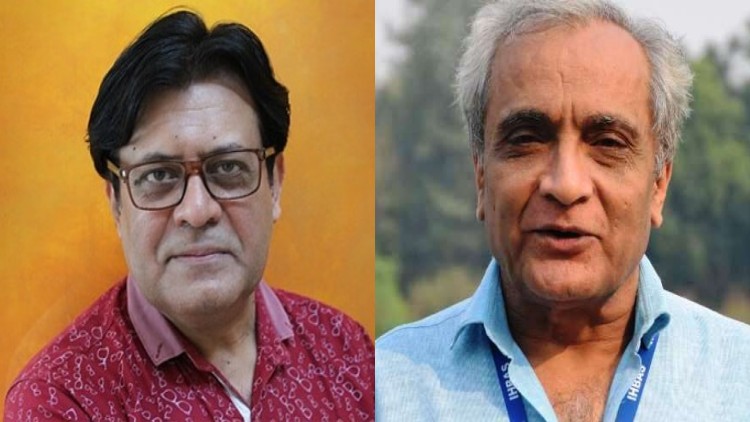
Baishali Adak/New Delhi
While the first wave of COVID and its ensuing lockdowns had jailed people in their homes and led to “psychological issues for some,” the number of COVID deaths this year and trauma of hospitalizations has led to “positively psychiatric disorders in many,” say mental health experts.
In fact, doctors are reporting a three-fold rise in the number of persons approaching them for mental health issues via physical meetings and online consultation.
Surprisingly, as much as adult men reporting stress due to “COVID fatalities in the family, loss of jobs or the economic situation,” children and women are falling prey to anxiety and depression due to exam-related worries and the pressures of ‘running a household.’
Awaz -The Voice spoke to Dr. Jitendra Nagpal, senior consultant and HOD, Psychiatry Department at Moolchand Medcity. He said, “I have definitely seen a three-fold increase in the number of patients in the last six months. The most common complaints are that of insomnia, followed by nightmares about life coming to an end, feeling marooned, the phobia of getting COVID and not coming out of hospital,” he explained.
“At the same time, we have been getting lot of calls regarding adolescents. India has a population of about 30 crores in the age bracket of 10-19 years. They are supposed to be finishing their exams, taking up jobs and start supporting their families at this time. In the absence of these options they are developing what we call a ‘frustration/aggression syndrome,’ Dr. Nagpal said.
Mental health helplines such as CARUNA being run by the Civil Services Association of India and Delhi’s Vision Divyang Foundation have been reporting the same.
Neha Gupta, a rehabilitation psychologist at CARUNA, said, “We have been getting around 50 calls per day. Many of them are from worried parents about small children. Kids are supposed to go to school and have outdoor playtime with their own age group in a natural environment. Instead, what they are getting is a lot of screen time including mobile and television. Addiction to internet, social media and violent video games has increased.”
She elaborated, “We received a case recently where a boy aged around 12 years was being handled by his father as the rest of the family was COVID positive and in hospital. However, due to negligence, he developed severe behaviourial issues. This went to the extent that he became completely out of control and his mother had to get back to him while still herself seriously ill.”
Dr. Nagpal pointed out that there is a “gender perspective to the COVID/lockdown induced depression.” “Women are suffering 3-4 times more. They have to do their jobs even if they are working-from-home, cook food, clean, mop, take care of the children and elderly, and anybody who has contracted COVID including themselves.
There has been a rise in the incidence of domestic violence and what we call ‘compassion fatigue.’ It means when a caregiver -- mostly women in our case -- become victims of depression working 24 hours a day caring for everyone,” he said.
Another renowned Delhi-based psychiatry specialist, Dr. Nimesh Desai, Director of the Institute of Human Behaviour and Allied Sciences (IHBAS), said he suspects that the cases he is getting “is only the tip of the iceberg.”
“Right now the cases we are receiving are really the severe ones -- for example, people who were already suffering a range of mental disorders like Schizophrenia, Obsessive Compulsive Disorders (OCD), panic attacks, etc. and COVID had a trigger effect on them. A lot of people are still not being able to approach us because of curfew restrictions or the fear of catching COVID if they come to a hospital,” he pointed out.
“We wish more people knew about tele-consultation, but we suspect that we will get a deluge of cases once the lockdown is lifted and patients are able to physically reach us. This will happen in the next 4-6 months,” he said.
What advise are counselors and doctors giving to people to keep their sanity in these difficult times?
Mukesh Gupta, director, Vision Divyang Foundation, said, “We have been telling people who call on our helpline to allot a limited time to TV or social media and not exceed it under any circumstances. Absorbing and internalizing all the news of deaths and new diseases and wars breaking out anywhere in the world will not help your immune system.”
“Second, we tell our callers to maintain a routine, plan their day in advance, sleep properly, take a good shower, wear clean comfortable clothes, eat healthy and exercise regularly. Talking to loved ones whether in person or on phone and keeping in touch with friends is extremely important.
“Also, fear should be met with factual knowledge; knowledge leads to empowerment and lesser stress,” Mukesh said.
(For help with mental health, call the IHBAS helpline: 9868396824 (10 am-1 pm for psychiatric medical treatment) & 9868396841 (8 am-8 pm for psychological support & counselling).
CARUNA helplines: 9810720722 & 9810682881 from 10 am-5 pm)
